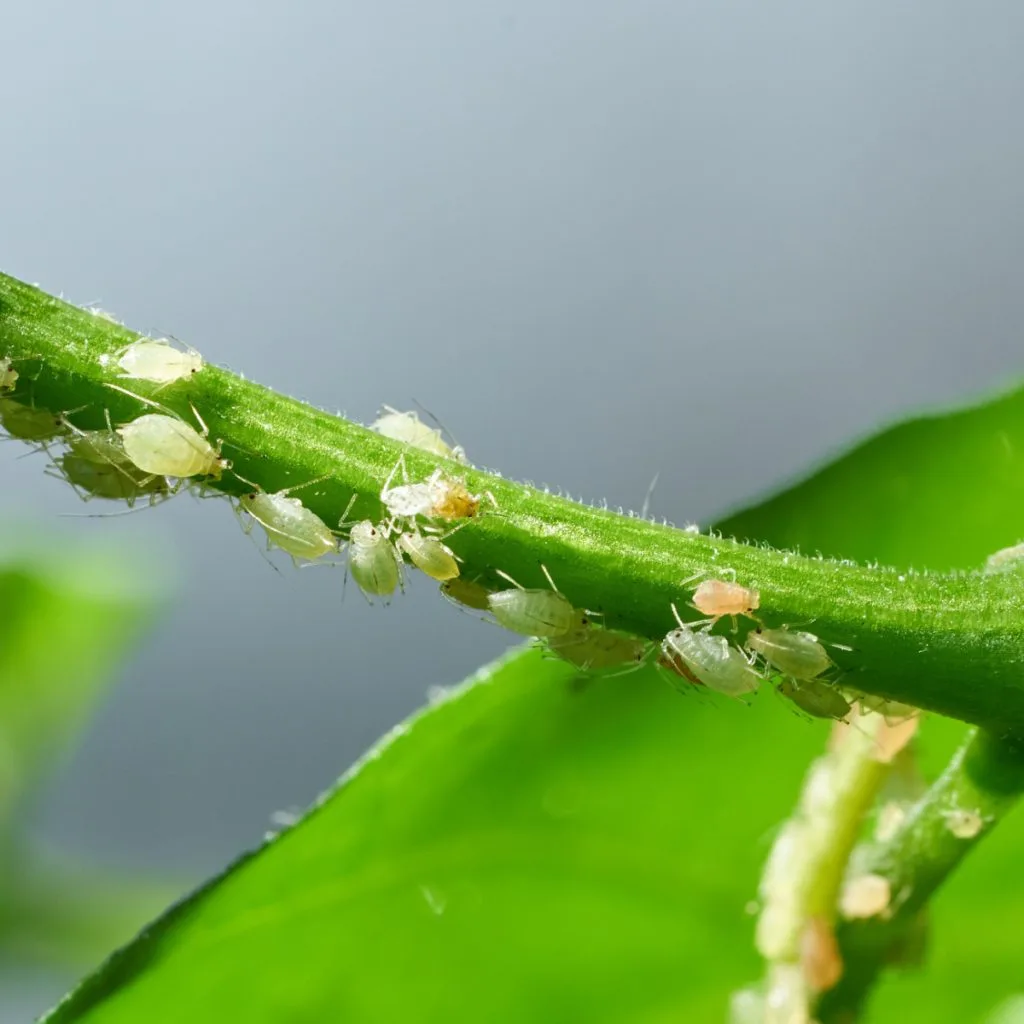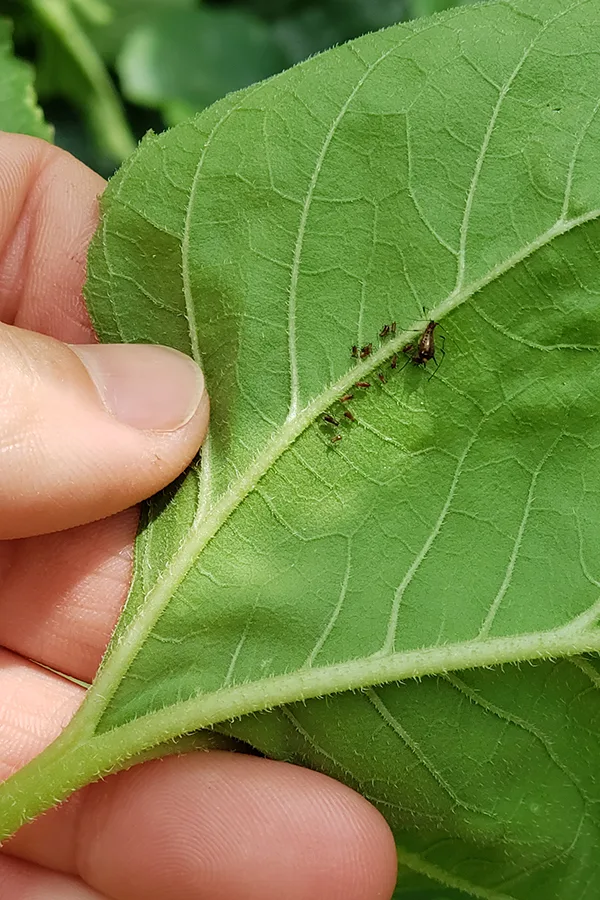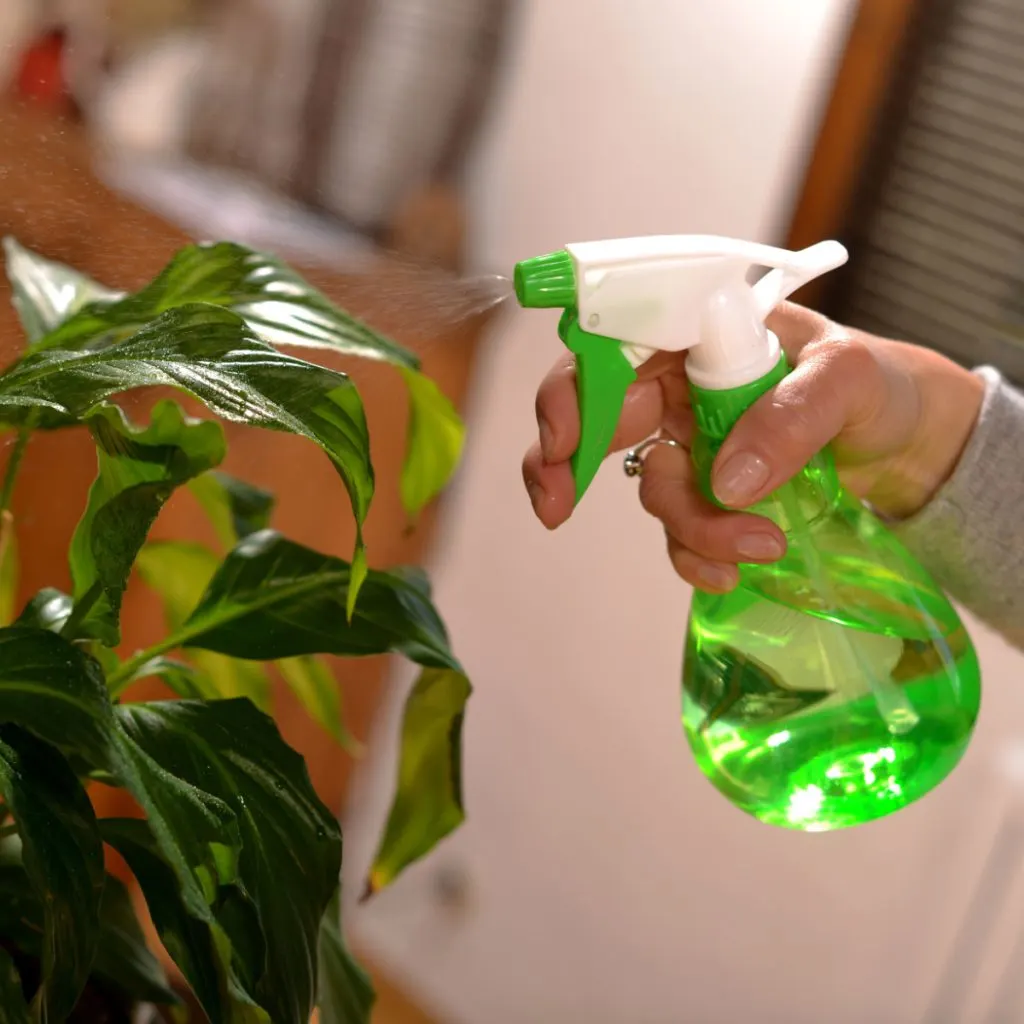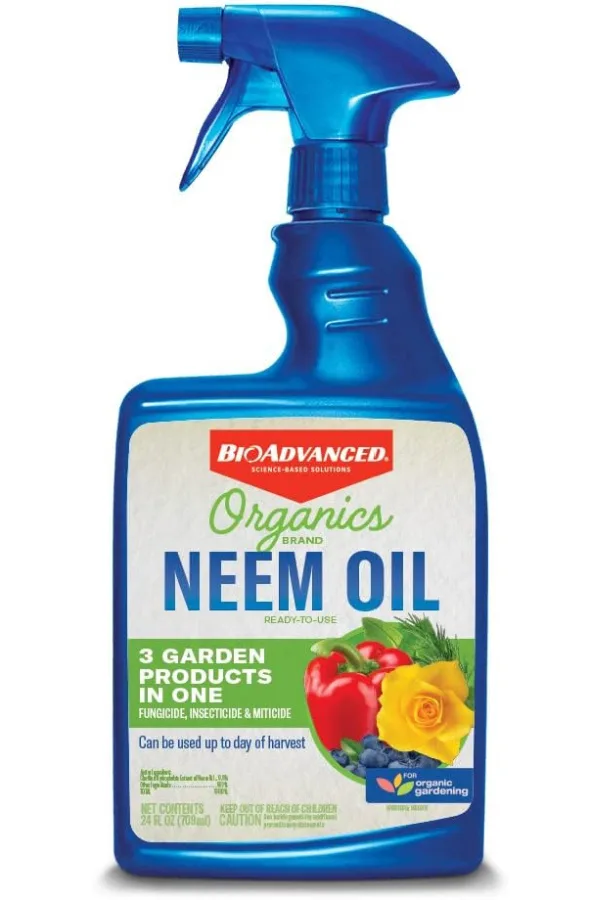Looking for a few simple tips to get rid of aphids on your houseplants – and keep them safe from aphid attacks in the future for good?
Aphids are the most common household insect pest of all – and it’s easy to see why. Due to their small size, aphids can easily come indoors through small cracks in windows, doors and foundations. Even more commonly, they can hitch a ride in on plants or foliage brought indoors. And are there ever a lot of aphids in the world to find a way indoors!
In total, there are around 5,000 different species of aphids. Most are light green in color, but you can also find black, white, and grey aphids as well. And at just 1/8 inch in length or less, they can be hard to spot. That is, until their damage starts to appear.

The Damage Aphids Cause – How To Keep Houseplants Safe From Aphids
An aphid infestation can occur well before you are even aware there is an issue. They multiply quickly and easily. Due to their size and the fact that they often are found on the underside of leaves, they can be difficult to detect.
They also happen to be highly mobile and can travel from one plant to another easily. In an indoor setting, they can spread by crawling or flying. So once you start to see aphids on one of your houseplants, it’s only a matter of time before they start to take over your other plants.
Aphids survive by eating the nutrient-filled softer parts of a plant. Leaves, stems, branches, and even the bud and fruit of the plant are all fair game. They tend to cluster in areas of new growth of the plant. This can cause significant damage to plants, especially since aphids multiple quickly.
As aphids eat plant material, they leave behind a sticky substance from their waste called “honeydew”. In addition to their dining on the vegetation, this byproduct can cause fungus and sooty mold growth on your plants.
Eventually, plants will start to look deformed and damaged. If bad enough, it can cause plants to start dropping their leaves. Even worse, their buds and fruit can start to become deformed and die off as well.

So how do you stop them? And how can you keep them away for good? Believe it or not, there are actually four simple and safe methods that work like a charm!
How To Keep Houseplants Safe From Aphids – 4 Simple Ways To Get Rid Of Aphids!
There is some good news in the battle against aphids – and that is that you do not have to use harsh chemicals or sprays in order to keep aphids off of your houseplants. In fact, the four natural solutions below actually work better than using chemicals and commercial products.
Most of these solutions utilize items that are readily available in your home. While all of the methods work, you will need to be consistent with them to completely get rid of a large aphid infestation. Here is a look at all four and how to use them effectively!
#1 Water – How To Keep Houseplants Safe From Aphids
As simple as it sounds, one of the most effective and easiest ways to get rid of aphids is with water – and there are actually a few different methods for its use.
For light infestations, you can take a cotton swab and soak it in water, and then use the damp swab to wipe down areas of your plants where the aphids are present. They will come right off with the swab with little trouble.

For heavier infestations, it’s better to use a stronger stream of cold water. This can be done best by using a basic plastic spray bottle filled with cold water. Then set the top knob to the “jet” or “heavy” setting to get a heavier dose of water. You’ll likely want to do this outside if possible or in your bathtub or sink. Affiliate Link: JohnBee Empty Adjustable Spray Bottles (16oz/2Pack)
Unfortunately, if you have a plant with delicate foliage, it might not be able to tolerate spraying. If that’s the case, you can attempt to dip the plant in water. Keep the foliage in the water for a few minutes to dislodge insects. Make sure to use clean, room temperature water to keep the plant from getting shocked.
When using water, you might need to repeat the process a few times for complete removal.
#2 Homemade Soap Spray – How To Keep Houseplants Safe From Aphids
You can also prepare a very effective homemade spray with pure liquid soap and water to keep aphids off of your houseplants.
To create the homemade spray, take a small bucket and fill it with water. Then, mix in a few tablespoons of liquid soap. Avoid using detergents and use only liquid soap. The difference between the two are that soaps are derived from biodegradable natural ingredients (oils, fats, etc.), while detergents are made from man-made chemicals.
After preparing this solution, you can use a spray bottle to spray the solution directly on the aphids. You want to make sure to soak the entire infested area, including the underside of the leaves. The homemade solution will kill aphids on contact but not harm your plant.

#3 Garlic Spray – How To Keep Houseplants Safe From Aphids
Another great choice that works to stop aphids is garlic spray. It works by making the plants sticky, and the bugs simply do not want to lay eggs on the sticky plants or stems.
You will need only water, garlic, liquid soap, and a little hot pepper powder to prepare a simple garlic spray. To make, crush a whole garlic clove and soak it in two cups of hot water.
Leave the mix to sit overnight. Then, the next morning, strain out the garlic from the water. At this point, add in one tablespoon of hot pepper and a few drops of liquid soap to the water. Place the solution in a spray bottle to spray the garlic solution on your houseplants.
Like the homemade soap spray, make sure to soak the entire infected area including under the leaves. It will not only kill the aphids, it will also keep them from coming back. You can store the garlic solution in your fridge for up to one week for repeat applications.
#4 Neem Oil – How To Keep Houseplants Safe From Aphids
Looking for a great way to take care of an existing aphid population and also prevent them from coming back? Neem oil is the answer! Neem oil is made from neem trees. It is an organic and biodegradable natural pesticide that will not harm your plants or your family and pets.
It is a both a highly effective way to kill aphids – and to spray on your plants periodically to keep them from ever becoming a problem. Affiliate Link: BioAdvanced Organics Brand Neem Oil, Ready-to-Use, 24 oz
Make sure to follow the instructions carefully when using neem oil since some products come ready to use while others may need to be diluted in water before use. As an added bonus, neem oil also works on beetles, mealy bugs, leafminers, and other tiny insects – indoors or outdoors!
Here is to getting rid of the aphids on your houseplants – and keeping them safe from attacks in the future as well. And if you are looking for a great way to fertilize your houseplants for free, be sure to check out our article: How To Use Coffee Grounds & Coffee To Fertilize Houseplants.
Simple Garden Life
Follow Our Facebook Page For Even More Great Tips! Simple Garden Life Facebook Page
Simple Garden Life is a website dedicated to keeping gardening fun, simple and enjoyable! We publish two new articles each week along with a new garden podcast episode every two weeks. This article may contain affiliate links.

